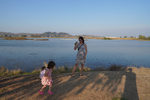We hear a lot about how good it is for their children to be brought up in a bilingual environment. I am happy that such is our home, but it is one with a predominance of English. Dean is learning Polish, and even demands, to my dismay, that I did not speak to him in English.
To little Rose I only speak Polish. To my surprise, she has clearly begun to use single words in English! She snow says “no”, “go”, “bye.” In the morning when we drink coffee, she points at the cup and shouts coffee in Polish “kau-ka.” She doesn’t yet say “Mama”, but with “Ta-ta” (Daddy) she has no problems. Certainly she understands Polish. She reacts to words like “shoes”, “walk”, “jump up”. It seems to me that in the company of Dean she uses English words more willingly.
I know that children raised in homes where more than one language is spoken start to talk later, so I am glad that she is even beginning to talk at all. I in the house with only one-spoken language, have not started to to speak until the age of about three.
I am curious, will Rose actually be bilingual in the future? This year she will likely start preschool.
I chose one where only English is spoken. There will be opportunities in the future to learn other languages.
Surely it would be better, if Rose could hear the Polish language from other people, not just from me. But for now, on a daily basis, she does not. In the nearby city there is a weekend Polish school, which might be beneficial for her in the future. I went to a similar school a long time in London, and I remember that most of the children spoke to each other in English.
I know that when Rose will start to say more to me in English, I should pretend that I only understand Polish. I will try. Rose is stubborn, so when she decides that she can speak Polish, then there will be nothing to stand in her way.
I can’t tell yet if I am a good teacher. I speak quite quickly and not always clearly. I noticed that repeating the same words and verbs helps Rose a lot.
We have Polish songs and books. We can Skype Poland. For now, I am glad that my dad is visiting us in Berkeley, so surely Rose and Dean benefit from extra lessons.
I asked our Polish friend who has been living for many years on the East Coast, how did she cope with teaching Polish to her kids? Here is her reply:
When my children were little, I spoke to them only in Polish and we read together huge amount of Polish books (English, too). Then they were all the talking in Polish brilliantly. More importantly they talked to each other in Polish. The problems began when the youngest daughter went to school. The children began to talk with each other in English and only with me in Polish, and after some time I also began to speak English to me.Their knowledge of Polish suffered and did not keep their general intellectual development.
The oldest daughter speaks the best. She had the opportunity to spend a lot of time with her grandparents.The younger kids unfortunately did not, and this has had consequence in their knowledge of the language.The best way to sustain the ability of conversation and learning is to stay in Poland and have fun with peer conversations. Books, movies and of course family conversations are also vital.
The most important are the basics – even if children lose contact with the language at a later time (such as did mine), traveling to Poland and language immersion language will very effectively help quickly make up for deficiencies. The easiest way to maintain bilingualism children in the family is talking in Polish on a daily basis. In our case, unfortunately, I was the only one speaking in Polish. Any serious discussions were held in English, because we don’t have Polish family and almost no Polish friends in the US.

